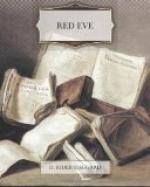Now when all that company understood the meaning of these outspoken words, they swayed to and fro and whispered like reeds in an evening wind. Presently above this whispering a soft yet penetrating voice was heard to say:
“If this English knight desires to study the poor face of Acour, de Noyon, and Cattrina, he who owns it is much honoured and prays your Excellency’s leave to wait upon his pleasure.”
So saying a tall and noble-looking man, who wore the badge of a white swan worked in pearls upon his rich tunic, stepped forward out of the ring of courtiers and bowed, first to the Doge and next to Hugh.
De Cressi looked at his handsome face with its quick dark eyes and little, square-cut, black beard, and answered:
“I thank you, Sir Edmund Acour, for I take it you are he. Now I shall never forget you again, for though a man may shift his armour he cannot change his countenance”—a saying at which de Noyon coloured a little and looked down uneasily.
“Cavalier de Cressi, he whom you seek is before you; we ourselves vouch for his identity,” said the Doge. “Now be pleased to set out your case.”
“My private case I thrust to one side,” answered Hugh, Sir Geoffrey interpreting all the time, “for it is a matter between this Count, a certain lady and myself, and can wait. That which I have to lay before you, Illustrious, has to do with my master the King of England, as whose champion I am here to-day. I accuse this lord of the three names of black treachery to his august liege, Edward, all details of which treason I am prepared to furnish, and on behalf of that most puissant monarch I challenge him to single combat, as I am empowered and commissioned to do.”
“Why should I fight the King of England’s bravoes?” inquired Acour in a languid voice of those who stood about him, a question at which they laughed.
“If the charge of treason is not sufficient,” went on Hugh, “I’ll add to it one of cowardice. At the battle of Crecy, as a man here will bear me witness,” and he pointed to Dick, “I overcame in single combat a knight who wore upon his shield the cognizance of a wolf and on his helm a wolf’s head, which were the arms of Sir Pierre de la Roche. At this knight’s prayer I spared his life, for that day we took no prisoners, and let him go. Afterward I fought with another knight carrying the cognizance of a white swan, the arms of the Count de Noyon, and slew him in fair and single fight. But before he died he told me that he bore that armour by command of his lord, the Count de Noyon, and that the said Count fought that day in his mail because he feared the vengeance of the King of England and my own. Thus it came about that the Wolf who fought paid the price for the Swan who fled away, hid in the armour of his friend, whom he left to die for him.”
There followed a great silence, for all those noble lords and ladies who thought little of treason, which to most of them was a very familiar thing, were not a little stirred by this tale of cowardice and false arms. The Doge said:




